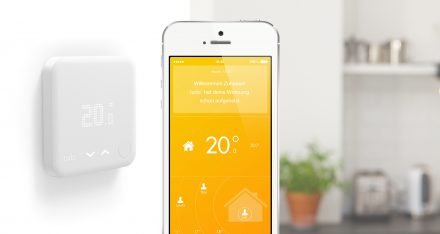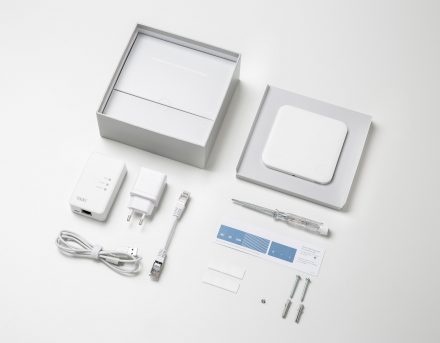Whether at the Mobile World Congress, CeBIT or SXSW, the Internet of Things (IoT) is one of the hottest topics in the digital world today. tado° shows us what a well-made, successful IoT solution can look like. The startup from Munich is teaching heating and air conditioning systems how to think; at the same time, without even trying, it is proving that networked products, properly implemented, are miles ahead of their analog predecessors.
It’s a familiar situation: you get home during the cold-weather season, and your apartment is freezing. It can take a while for your own four walls to get back to a comfortable temperature. Some of our chillier contemporaries solve this problem very pragmatically, by leaving the heater running even when no one is home. But this solution is not just bad for your personal climate karma – it also has a significant impact on your heating bill. In warmer climates, the same problem comes up in the summer: the air conditioner takes a while to get an overheated apartment back down to a tolerable indoor temperature.
The smart heater

tado° has the solution: the tado° app collects data about the user’s requirements and
combines it with publicly available information like weather data. An algorithm processes this knowledge and uses it to control the heating and air conditioning systems. Practically speaking, that means the app knows when the last occupant left the house, for instance, and then turns down the heat. When an occupant is on the way home from work in the evening, tado° heats the apartment according to the expected outdoor temperature. It all takes place automatically – the consumer doesn’t need to do anything. The best part: this smart heater is not just convenient, it also saves you cash. Private households can save several hundred euros a year, said tado° CEO Christian Deilmann in an interview with Munich Startup.
Like all IoT solutions, the system is based on using and further processing data. Once users provide their approval, the installers can access operating data via a remote maintenance portal, for instance water pressure data or error codes for the heating systems. The workers can then contact the customers directly to inform them of the malfunction and to order the right replacement parts.
The issue of data security is a high priority for tado°. In order to protect the data being processed, the system uses the same security standards as for online banking. No information is given to third parties without the user’s approval. As Deilmann explains,
“We treat the data we gather very carefully. It is important for our customers to be able to trust us completely, the way they trust their doctor or their bank.”
IoT as a megatrend
Deilmann sees the Internet of Things as a megatrend that will directly influence our lives:
“Networked products are vastly superior to the conventional options, and the technology keeps getting cheaper. From cars to heaters and alarm systems, many things in our everyday lives are now becoming online products.”
The trend is also reflected in their business figures: tado° is currently generating revenue in the eight figures, and its revenue grew by 350 percent in the past year. The company has about 100 employees and is represented in twelve European countries. It recently established a sales partnership with o2 in Great Britain and AT&T in the United States.

Beginnings are always difficult
Six years ago, tado° got started when Christian Deilmann had the idea while studying at MIT. Back in Germany once again, he brought Johannes Schwarz, a college friend from the TU Munich, Valentin Sawadski and later also Leopold von Bismarck on board. In 2010, the team tested the first prototype within their own four walls and founded tado° the next year. Initially, the founding team invested their personal savings. Pretty soon, it became clear that they had to dedicate all their time to the project, and they left their jobs. At first, they did not pay themselves any salaries. To finance product development, the young entrepreneurs looked for public subsidies and venture capital:
“We took an enormous step when we left our jobs. At some point, financially speaking, the air naturally becomes thin. If we had not received any funding, that would have been it for a while.”

Yet something else happened. EXIST approved a startup grant, and Deilmann’s former employer Target Partners offered risk capital. The team was spoiled for choice because reliable financing through venture capital meant exclusion from the EXIST support program. The result of their consideration:
“We decided against EXIST and chose venture capital because for us, it meant a faster path to growth.”
However, money alone was not everything – for the founders, the support they received from the Munich network was priceless:
“There are great contacts and mentors in Munich who can be approached. What really helped us were the two startup networks LMU Entrepreneurship Center and UnternehmerTUM. They provided offices free of charge, and we went over our documentation together and fine-tuned the pitches.”
According to Deilmann, one side effect of network collaboration was that the founders were able to develop the necessary self-confidence right away.



